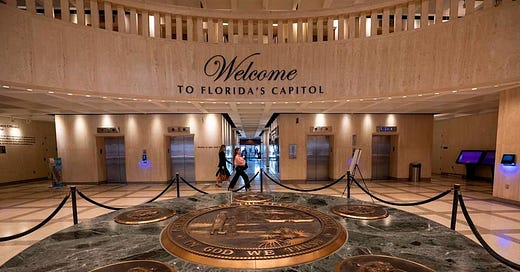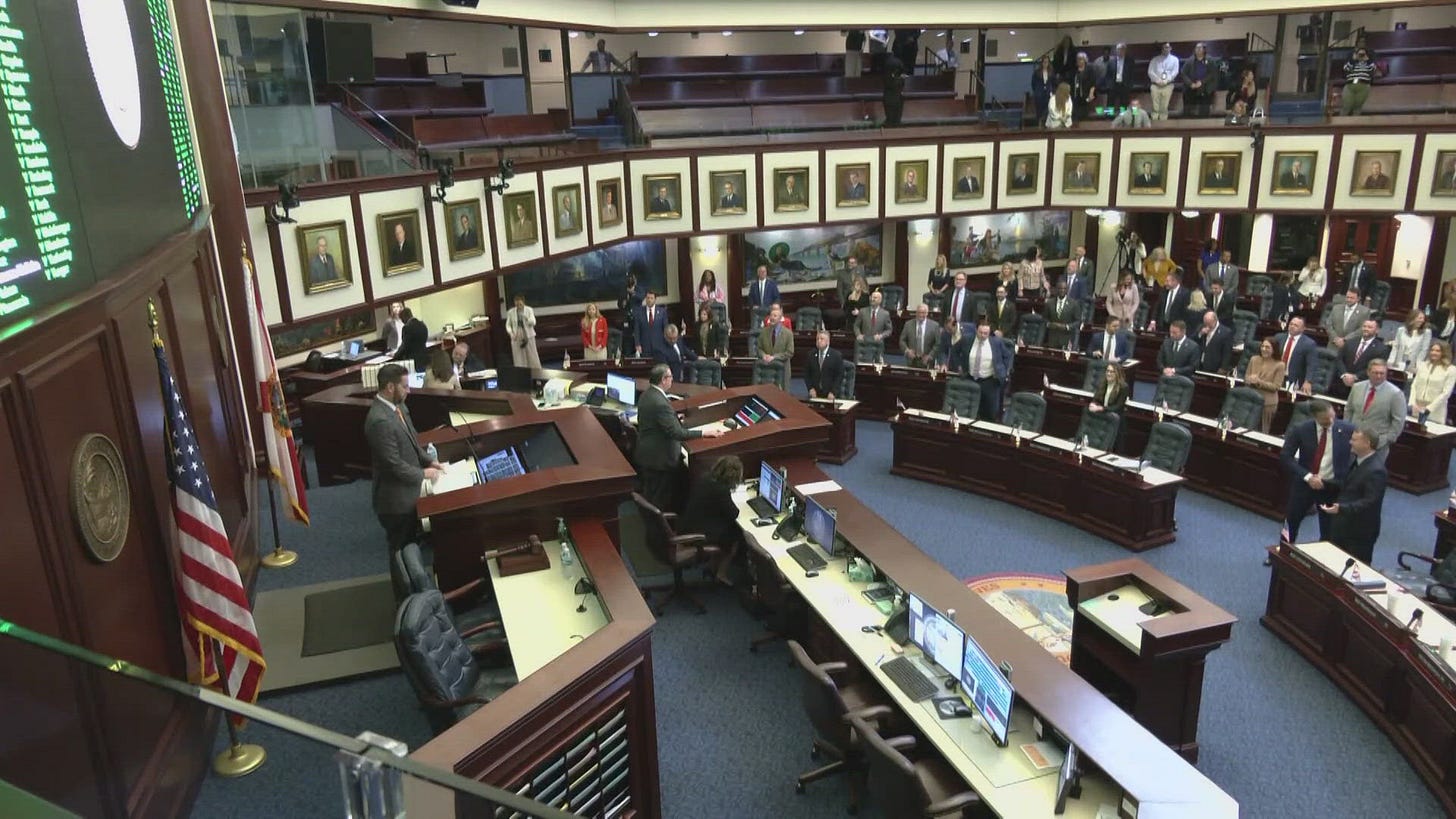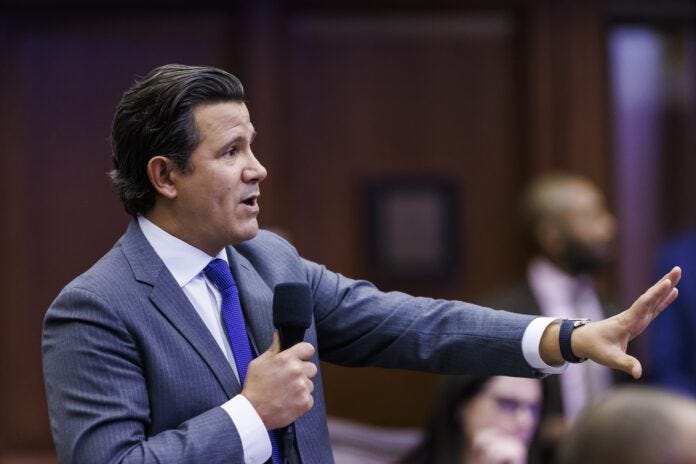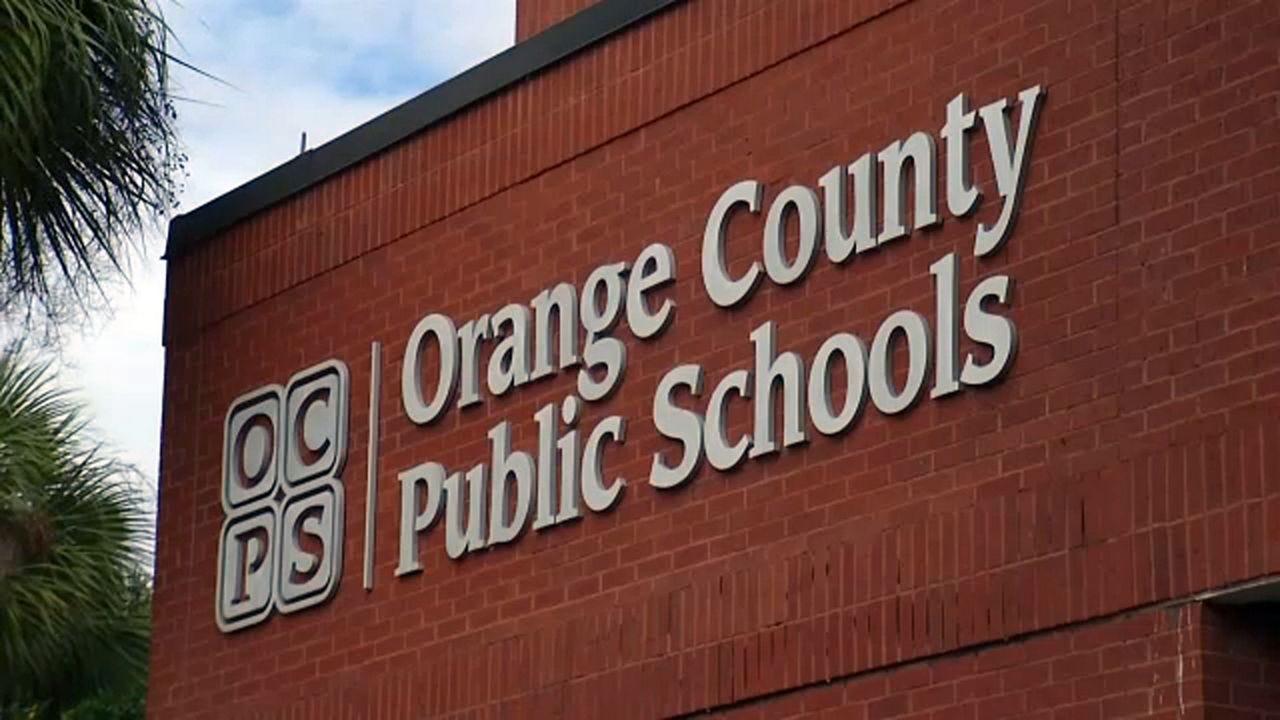Florida Budget Impasse Forces Extension to Legislative Session & House Approves ‘Historic’ $5 Billion Tax Cut
April 28, 2025 - This Week's News from Central Florida
Welcome to this week’s edition of the Central Florida Times, an independent, reader-supported newsletter focusing on the Sunshine State. These are the most important stories you need to know from across Central Florida. To never miss an update, subscribe here:
Here’s the latest from Central Florida…
Florida Budget Impasse Forces Extension to Legislative Session
Florida’s House and Senate remain deadlocked over next year’s state budget, triggering an extended legislative session as negotiators fail to resolve clashes over tax cuts and spending priorities. With the session originally set to end May 2, negotiations remain unresolved, especially around competing tax relief proposals as lawmakers now face overtime to meet their constitutional duty of finalizing a budget before July 1. Senate President Ben Albritton (R-Wauchula) acknowledged the delay, telling senators, “Timelines have come and gone,” as major components like education funding, health care spending, and property tax relief remain unsettled. The primary roadblock is disagreement on overall spending. The House proposes a $113 billion budget, $4.4 billion less than the Senate’s plan, alongside $5.5 billion in tax cuts. A key component of their spending proposal includes slashing the sales tax rate from 6% to 5.25%. In contrast, the Senate suggests $2.2 billion in cuts, primarily from a permanent sales tax exemption on clothing and shoes under $75, and seasonal tax holidays. The package by Senate leaders also reduces the business rent tax from 2% to 1% and provides a one-time credit on vehicle registration fees. As Governor Ron DeSantis has publicly advocated for the permanent elimination of property taxes for months, President Abritton’s plan calls for a study to examine the implications of abolishing ad valorem taxes, with the possibility of placing a constitutional amendment on the 2026 ballot for voter consideration. Negotiators must finalize a topline figure soon to meet the state’s required 72-hour review period before a final vote. President Albritton has expressed concern about earlier projections by state economists that warn of a $7 billion revenue gap in two years if spending isn’t reined in. Albritton says the House’s approach risks achieving a future budget shortfall with their ambitious tax cuts, while Speaker Daniel Perez (R-Miami) accused the Senate of “pathological overspending”. With over a $4 billion gap between the chambers’ budgets, lawmakers must reach a deal before July 1 to avoid a government shutdown. The impasse also threatens funding for schools, health care, pay raises for state employees, and local tourism development and promotion, leaving key state priorities in limbo as negotiations continue. Despite the impasse, Albritton said he and Perez remain committed to finding common ground.
Florida House Approves ‘Historic’ $5 Billion Tax Cut
The Florida House passed a sweeping $5 billion tax relief package on Friday, with a 78-29 vote, marking what supporters call a “record-breaking” and “historic” reduction in state taxes. The broad measure, HB 7033, would permanently lower the state sales tax rate by 0.75 percentage points to 5.25%, and reduce other sales taxes, including commercial rent, electricity, mobile home purchases, and coin-operated amusement machines. While the bill drew mostly partisan support, it faces opposition from both Governor Ron DeSantis and Senate President Ben Albritton (R-Wauchula). DeSantis has advocated for eliminating property taxes and providing a $1,000 rebate to homeowners, while Albritton has proposed a more restrained $2.1 billion tax cut focused on sales tax holidays and targeted exemptions. The latter includes a permanent elimination of sales tax on clothing and shoes under $75 and reducing the business rent tax to 1%. A major point of contention is the redirection of tourist development tax dollars, currently used for tourism marketing and local projects, into general county revenue to reduce property taxes beginning in 2026. Critics, including tourism industry leaders and some lawmakers, warn this could undermine local economies and threaten millions of jobs and entire sectors dependent on tourism. The disagreement over the scale and structure of tax cuts is a key reason the Legislature is unlikely to finalize a budget before the scheduled end of the session on May 2. The fate of the now-approved House tax cuts remains uncertain as it moves to the Senate for consideration.
House Passes Condo Safety Bill with Focus on Reducing Costs
Lawmakers in the Florida House have overwhelmingly approved a new condo safety package, advancing legislation designed to ease financial burdens on condo owners while maintaining strict safety standards. The bill, HB 913, passed 113-2 and heads next to the Senate. Sponsored by Rep. Vicki Lopez (R-Miami), the measure updates laws created after the deadly 2021 Champlain Towers South collapse in Surfside, which killed 98 people. “This is landmark legislation that finally does provide the relief, the financial relief, that all of our condo owners deserve,” Lopez said. HB 913 allows condo associations to use lines of credit to fund structural integrity reserve studies (SIRS) and clarifies that only buildings with three or more habitable stories must complete SIRS. This change is intended to reduce reliance on owner assessments, which became burdensome for countless Floridians and forced many to sell their units. It also introduces electronic voting options in condo-association elections, mandates transparency for condo board meetings, and tightens rules on conflict of interest by barring firms conducting inspections from bidding on related repairs. Post-Surfside laws, starting with Senate Bill 4-D in 2022, mandated milestone inspections and SIRS for buildings over 30 years old, leading to skyrocketing fees and assessments, some in excess of $100,000 per unit. This has hit seniors on fixed incomes hardest, with many facing foreclosure or forced sales. Critics, including Gov. DeSantis, argue the reforms still fail to address underlying issues like developer accountability and insurance costs by easing financial pressures on condo associations without imposing stricter regulations on developers. They argue developers should bear responsibility for initial construction defects that often lead to costly maintenance issues, instead of shifting the burden onto owners. The bill has been referred to the Senate, where it will be considered alongside companion bill SB 1742 for an upcoming floor vote. The Senate’s related bill, led by Sen. Jennifer Bradley (R-Fleming Island), similarly permits lines of credit and loans but adds a voluntary two-year pause on reserve contributions after inspections. It also permits condominium associations to invest their reserve funds through a registered adviser.
Democratic Leader Sen. Jason Pizzo Leaves Party, Declares It 'Dead'
Florida Senate Minority Leader Jason Pizzo (D-Hollywood) announced Thursday he is leaving the Democratic Party and registering with no-party affiliation, a move that stunned fellow legislators and resulted in him stepping down from his leadership role. “The Democratic Party in Florida is dead,” Pizzo said, explaining that while the party still has people who could revive it, “they don’t want it to be me.” He added that today’s Democratic Party “craves and screams anarchy and then demands amnesty,” contrasting it with the version his father supported. Pizzo said he filed paperwork to change his voter registration. Criticizing “modern partisanship,” he said voters want practical leadership over political gamesmanship. Pizzo added that dropping his party label will help him serve more transparently and better represent Florida’s 3.7 million non-affiliated voters. The two-term senator, who represents parts of Miami-Dade and Broward counties, has hinted at a run for governor in 2026 and stated that the decision frees him to “run free and clear.” Florida Democratic Party Chair Nikki Fried called Pizzo “ineffective and unpopular,” saying his resignation is “one of the best things to happen to the party in years.” She accused him of putting ambition ahead of party values. Similarly, House Democratic Leader Fentrice Driskell (D-Tampa) said Pizzo had “alienated himself from the Democratic Party for a long time now” and is “distracted by his ambition to be governor.” Senate Democrats quickly chose Sen. Lori Berman (D-Boca Raton) to succeed Pizzo as caucus leader and complete the 2024-26 term. The latest news comes amid continued challenges for Florida Democrats, who have struggled to maintain political ground in recent years.
Florida House Passes Bills That Would Redirect Tourism Tax Revenue
Florida’s House of Representatives has approved two bills that could significantly alter how the state’s Tourist Development Tax (TDT) is spent, sparking strong reactions from tourism advocates and local leaders. House Bills 7033 and 1221 propose shifting TDT revenue—currently earmarked for tourism marketing and development—to cover general expenses such as property tax reductions. The legislation would also eliminate local Tourism Development Councils (TDCs), which oversee tourism promotion, make spending recommendations, ensure financial accountability, and provide strategic guidance to benefit the local economy. The Tourist Development Tax, often called bed taxes or resort taxes, is a levy on hotel stays and short-term rentals (typically six months or less) and is intended to promote and support tourism. It funds tourism promotion and advertising, funds the operation of tourist-related attractions and facilities like convention centers, sports stadiums, arenas, auditoriums, and museums, and supports infrastructure development as well as public transit. Under the proposals, TDT dollars could offset property tax cuts instead of funding beach renourishment, event promotion, or capital projects that aim to attract visitors. TDT revenue was intended to partially fund the now-canceled Tampa Bay Rays ballpark in St. Petersburg as part of the Historic Gas Plant District redevelopment.
Opponents argue the move undermines local control and risks damaging Florida’s tourism-dependent economy. They emphasize that Florida’s lack of a state income tax is directly linked to the tax revenue generated by visitors through the TDT, which funds the very campaigns that bring them to the state. This reinvestment cycle, they argue, generates further revenue, jobs, and opportunities. Other critics, including chambers of commerce and coastal community leaders, say removing dedicated tourism funding could hurt small towns and rural areas that rely on these dollars as the primary funding mechanism for economic development. They warn that tourism isn’t automatic—it’s earned, and Florida must compete with other states and global destinations for visitors. The Sunshine State continues to break tourism records, welcoming nearly 143 million tourists in 2024, generating $131 billion in visitor spending and almost $37 billion in tax revenue. Lawmakers supportive of the legislation, including House Budget Chair Lawrence McClure (R-Dover), defend the measures as offering fiscal flexibility that can be used to fund community needs. The Florida Senate has proposed a more limited measure, capping county tourism marketing funds at $50 million annually while allowing TDT funds for infrastructure and workforce housing. Both bills have passed the House and now head to the Senate.
Orange County Schools Expect to Lose $28M in Funding, 3,100 Students Next Year
Orange County Public Schools (OCPS) is bracing for a significant loss of about 3,100 students and a $27.8 million reduction in state funding for the 2025-26 school year, the largest enrollment drop since the pandemic. District officials attribute the decline to falling birth rates and the rapid expansion of Florida’s school voucher program, which now allows any student to use state-funded scholarships for private or home education. Additionally, the termination of federal COVID-19 funding designated for schools exacerbates the challenges facing educational budgets. With public schools funded on a per-student basis, these shifts have left OCPS facing tough budget decisions. In a memo to staff, OCPS warned the funding loss would have “major implications,” requiring all departments to cut operating budgets by 2%. Fears of teacher layoffs and larger class sizes have emerged, though district leaders say their priority is retaining educators and minimizing classroom impact. The district has hired a third-party firm to help recruit students back from private and charter schools, paying nearly $1,000 for each student who re-enrolls. Teacher union leaders and school board members stress the importance of protecting classrooms from cuts and are exploring innovative models, such as district-run charter and micro-schools, to remain competitive and attract families back to public education. OCPS could face even deeper cuts if pending legislation passes targeting specialized programs like Advanced Placement and International Baccalaureate courses. Orange County is facing this challenge along with 47 additional school districts in Florida that anticipate enrollment decreases.
Hope Florida Charity Probe Ends Without Key Testimonies, Federal Authorities to Investigate
Florida House lawmakers have concluded their investigation into the Hope Florida Foundation without hearing from key figures involved in the transfer of $10 million from a Medicaid settlement to the charity. This comes despite serious allegations of misconduct. Rep. Alex Andrade (R-Pensacola), chair of the Health Care Budget Subcommittee, who led the inquiry, previously stated that he believes Attorney General James Uthmeier and Hope Florida attorney Jeff Aaron participated in a criminal scheme involving the misuse of taxpayer funds stemming from the Medicaid settlement. The funds, part of a $67 million agreement with Centene, were directed to the Hope Florida Foundation and later funneled to two nonprofits, which then gave most of it to a political committee tied to Uthmeier. This money was then spent to oppose an amendment on the 2024 ballot to legalize recreational marijuana. Though Andrade said the evidence suggests money laundering and fraud, he emphasized that charging decisions are now up to federal investigators. The investigation closes as the legislative session wraps up on May 2. Several witnesses declined to appear and testify, citing legal privilege and confidentiality concerns. Andrade criticized the lack of transparency and said the episode highlights the need for policy reform, which he plans to focus on in the next legislative session. “I’ll leave the rest of the investigation up to the FBI and Department of Justice,” he said.
DeSantis Criticizes Lawmakers Over Cuts to Everglades Funding
Gov. Ron DeSantis is rebuking the Florida House for proposing nearly $500 million in cuts to Everglades and water quality funding, escalating an ongoing dispute with legislative leaders over state budget priorities. He accused House lawmakers of undermining his administration’s restoration efforts and urged them to “stop playing your petty games” and prioritize Floridians. The House's budget plan would slash nearly $500 million from Everglades restoration and water quality projects, far below the $805 million DeSantis recommended for the upcoming fiscal year. He also dismissed rebuttals from lawmakers that the cuts are justified because nearly $1 billion in related funds from the current budget remain unspent, insisting the money is already committed to ongoing projects. Since 2019, Florida has invested over $3.3 billion into Everglades improvements, launching more than 75 initiatives to improve nutrient quality and flow. DeSantis emphasized that ongoing restoration could create hundreds of thousands of jobs over the next 50 years.
Former Tampa Mayor Bob Buckhorn Eyes Return in 2027
Former Tampa Mayor Bob Buckhorn has announced plans to run for mayor again in 2027, nearly a decade after leaving office due to term limits. Buckhorn, who served from 2011 to 2019, said he’s eager to "finish the job" and continue shaping the city's future. “Tampa has more chapters to write and to the extent that I can be helpful, I will,” Buckhorn told a reporter with the Florida Phoenix. The two-term former mayor cited his passion for leadership and intention to run during a local appearance, but a formal announcement has not been made, nor has the necessary paperwork been filed. During his time in office, Buckhorn, a Democrat, was re-elected in 2016 with 95% of the vote. City Council member Bill Carlson, a vocal critic of Buckhorn and current Mayor Jane Castor, is also expected to run, aiming to shift focus from infrastructure to community-driven policies. The election is set for March 2, 2027.
FEMA Cuts $33M from St. Petersburg Resiliency Projects
Two critical resiliency projects in St. Petersburg are now in jeopardy after the Federal Emergency Management Agency (FEMA) rescinded $33.82 million in resiliency funding. The money, requested through the Building Resilient Infrastructure and Communities (BRIC) program, was intended to storm-harden sewage lift stations and combat tidal flooding in the Shore Acres neighborhood. FEMA Director Cameron Hamilton ended the BRIC program on April 4, calling it “wasteful” and “politicized.” City officials, however, dispute that characterization, emphasizing the nonpartisan need for climate resilience, especially after devastation from Hurricanes Debby, Helene, and Milton last year. St. Petersburg sought $13 million for strengthening lift stations and $20.82 million for backflow preventers and pump stations in flood-prone areas. The funds could have prevented millions in damages and widespread displacement of residents during the past storm season. Now, officials are rethinking their plans to protect vital infrastructure as staff seek alternative funding sources, including state appropriations, and submitting applications for other FEMA programs. Cities warn that the elimination of federal support leaves them with fewer resources to tackle escalating environmental threats. FEMA has canceled about $882 million in previously planned BRIC awards nationwide, aligning with the Trump administration’s broader approach to federal agencies and spending cuts.
Fifteen UCF International Students Lose Visas Amid National Immigration Crackdown
Fifteen international students at the University of Central Florida had their visas terminated over the past month, with one student detained by authorities, a UCF spokesperson has confirmed. The affected students, all on F-1 visas, were flagged by the U.S. Department of Homeland Security for either criminal records or failing to maintain their visa status. Each student was notified and advised to leave the country. Nationwide, more than 1,700 international students have had visas revoked, with revocations having occurred at other Florida universities, including UF, FSU, and FIU. Attorneys and faculty have raised concerns that many revocations are linked to minor infractions, such as traffic violations or participation in campus protests. Talat Rahman, UCF’s faculty union president, called the scale of terminations unprecedented and said students were being punished without due process.
Jacksonville Mayor Deegan Signs $3M Deal to Launch Esports Arena at UNF
Jacksonville Mayor Donna Deegan visited the University of North Florida last week to sign legislation providing $3 million to create an esports arena on campus. The new facility, called the Flight Deck, will open in January 2026 on the second floor of the John A. Delaney Student Union, aiming to position Jacksonville as a hub for competitive gaming and STEM education. The investment seeks to help UNF attract local, state, and national esports tournaments, tapping into the rapidly growing $3 billion esports industry, which is projected to double by 2030. UNF President Moez Limayem said, “the sky is the limit” for the arena’s potential to boost Jacksonville’s tourism and community engagement. The Flight Deck will feature 42 high-performance PC gaming stations and will support UNF’s goal of increasing enrollment from 17,000 to 25,000 students by 2028. Jacksonville University and Florida State College at Jacksonville have already launched similar esports spaces on their campuses. The investment marks Jacksonville’s largest campus contribution since upgrades to UNF’s track and field facilities, which has regularly attracted NCAA regional championships.
Thanks for reading this edition of the Central Florida Times. To never miss an update, subscribe for free:
In the meantime, if you learned something or found this read interesting, please consider sharing it to grow our community!











